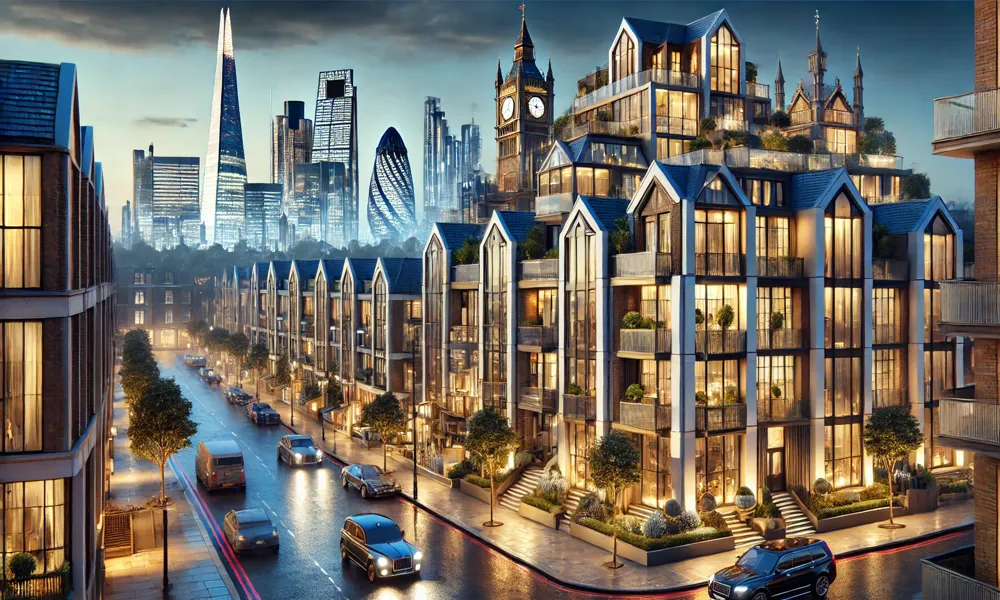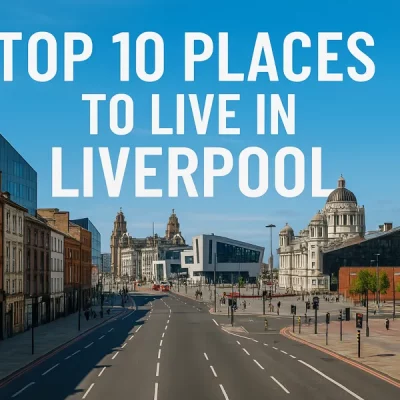Most Expensive Places to Live in UK
Table of Contents
The UK is home to some of the most desirable and high-cost locations in the world, where history, prestige, and economic influence drive up living expenses. From the busy metropolis of London to the academic powerhouses of Oxford and Cambridge, certain cities and districts stand out as exceptionally expensive places to live due to their strong job markets, high property demand, and cultural significance.
In London, affluent areas like Kensington, Chelsea, and Westminster offer a luxurious lifestyle, prime real estate, and unparalleled access to business, politics, and the arts. Meanwhile, Edinburgh, Scotland’s capital, and Brighton, England’s vibrant coastal city, provide rich cultural experiences and strong economies, but at a significant cost.
This guide explores the most expensive places to live in UK in 2025, analyzing their property prices, rental costs, job sectors, and overall cost of living. Whether you’re considering moving to one of these locations or simply curious about the cost of living in these premium areas, this blog will provide a detailed insight into the UK’s most exclusive places to call home.
Most Expensive Places to Live in United Kingdom
London
As the capital and financial epicenter of the UK, London stands as the most expensive place to live in the country. Its global significance in finance, commerce, and culture makes it a magnet for professionals and investors. However, the high cost of real estate, transportation, and daily living expenses makes London one of the priciest cities in the world. Despite the expense, many residents are drawn to its dynamic lifestyle, world-class amenities, and diverse job market. From the bustling financial districts of Canary Wharf and the City of London to the artistic and cultural hubs of Soho and Shoreditch, London offers something for everyone—at a premium price. Below are the key details of cost of living in London in 2025:
| Feature | Details |
| Average Property Price (2025) | £750,000 – £1,200,000 |
| Average Rent (1-bedroom apartment) | £2,000 – £3,500/month |
| Monthly Public Transport Cost | £180 – £250 |
| Cost of Living Index (UK Avg = 100) | 170 – 200 |
| Key Industries | Finance, Technology, Media, Fashion |
| Main Attractions | The Shard, Buckingham Palace, West End Theatres |
| Pros | Unmatched career opportunities, cultural diversity, global connectivity |
| Cons | High living costs, congestion, competitive housing market |
Oxford
Oxford, home to the world-renowned University of Oxford, is a city that blends academic excellence with historical elegance. Its rich educational heritage and beautiful architecture make it one of the most sought-after places to live. Oxford’s high living costs are driven by its prestigious status, strong job market, and limited housing supply. Although Oxford retains a small-town charm, it has a robust economy supported by research, technology, and education sectors. Many professionals, students, and academics choose Oxford for its quality of life, despite its expensive property market. Below are the key details of cost of living in Oxford 2025:
| Feature | Details |
| Average Property Price (2025) | £550,000 – £950,000 |
| Average Rent (1-bedroom apartment) | £1,500 – £2,500/month |
| Monthly Public Transport Cost | £90 – £140 |
| Cost of Living Index (UK Avg = 100) | 140 – 160 |
| Key Industries | Education, Research, Healthcare |
| Main Attractions | Oxford University, Bodleian Library, Ashmolean Museum |
| Pros | Academic excellence, historical charm, strong job market |
| Cons | Expensive housing, limited availability, tourist-heavy areas |
Cambridge
Much like Oxford, Cambridge is a city defined by its prestigious university, centuries-old architecture, and a thriving research and technology sector. Often referred to as “Silicon Fen”, Cambridge has emerged as a leading hub for technology startups, artificial intelligence, and biomedical research, attracting highly skilled professionals and businesses. This booming innovation sector has significantly driven up housing prices, making Cambridge one of the most expensive cities in the UK. Below is the cost of living in Cambridge for 2025:
| Feature | Details |
| Average Property Price (2025) | £500,000 – £900,000 |
| Average Rent (1-bedroom apartment) | £1,400 – £2,400/month |
| Monthly Public Transport Cost | £85 – £130 |
| Cost of Living Index (UK Avg = 100) | 135 – 155 |
| Key Industries | Tech Startups, AI, Biotech, Research |
| Main Attractions | Cambridge University, River Cam, King’s College Chapel |
| Pros | Thriving tech industry, picturesque landscapes, prestigious education |
| Cons | Costly housing, traffic congestion, rapid commercialization |
Kensington
A prestigious district within London, Kensington is synonymous with luxury, exclusivity, and affluence. Known for its high-end shopping, renowned museums, and proximity to royal parks, Kensington attracts wealthy residents, including celebrities, businessman, and international investors. With some of the most expensive real estate in the UK, the neighborhood offers elegant Georgian and Victorian townhouses, private garden squares, and upscale amenities. The combination of historical significance, cultural offerings, and an elite lifestyle cements Kensington as one of London’s most sought-after and costly areas. Below is the cost of living in Kensington:
| Feature | Details |
| Average Property Price (2025) | £2,000,000+ |
| Average Rent (1-bedroom apartment) | £4,000 – £7,500/month |
| Monthly Public Transport Cost | £200 – £300 |
| Cost of Living Index (UK Avg = 100) | 220+ |
| Key Industries | High-end Retail, Real Estate, Arts |
| Main Attractions | Natural History Museum, Kensington Palace, Harrods |
| Pros | Luxurious lifestyle, elite social circles, prime location |
| Cons | Extreme property prices, exclusive community, limited affordability |
Westminster
As the political and administrative heart of the UK, Westminster is one of London’s most significant and prestigious areas. Home to landmarks such as the Houses of Parliament, Buckingham Palace, and Westminster Abbey, this district is a global symbol of history, power, and governance. Westminster also features luxury hotels, embassies, and government institutions, making it a hub for politicians, diplomats, and high-ranking officials. Despite the high living costs, residents benefit from world-class amenities, access to some of London’s best theatres, fine dining options, and the peacefulness of nearby parks such as Hyde Park and St. James’s Park. Below is the cost of living in Westminster:
| Feature | Details |
| Average Property Price (2025) | £1,500,000 – £3,500,000 |
| Average Rent (1-bedroom apartment) | £3,500 – £6,500/month |
| Monthly Public Transport Cost | £180 – £280 |
| Cost of Living Index (UK Avg = 100) | 200+ |
| Key Industries | Government, Finance, Law, Diplomacy |
| Main Attractions | Buckingham Palace, Big Ben, Trafalgar Square |
| Pros | Central location, political significance, historic landmarks |
| Cons | Expensive housing, tourist-heavy |
Edinburgh
As Scotland’s capital, Edinburgh is famous for its stunning historic architecture, vibrant cultural scene, and strong financial sector. The city hosts the Edinburgh Festival Fringe, the world’s largest arts festival, which attracts millions of visitors annually. With its medieval Old Town, elegant Georgian New Town, and the iconic Edinburgh Castle, the city offers a unique blend of history, culture, and modern amenities. While Edinburgh is more affordable than London, it remains one of the most expensive places to live in Scotland, with higher-than-average property prices and rising rental costs. Below is the cost of living in Edinburgh:
| Feature | Details |
| Average Property Price (2025) | £400,000 – £750,000 |
| Average Rent (1-bedroom apartment) | £1,200 – £2,000/month |
| Monthly Public Transport Cost | £70 – £120 |
| Cost of Living Index (UK Avg = 100) | 140 – 160 |
| Key Industries | Finance, Education, Tourism, Technology |
| Main Attractions | Edinburgh Castle, Arthur’s Seat, Royal Mile |
| Pros | Beautiful architecture, cultural events, top-ranked universities |
| Cons | Costly compared to other Scottish cities, unpredictable weather |
Brighton
Situation on England’s southern coast, Brighton is known for its bohemian lifestyle, vibrant arts scene, and stunning seaside views. The city attracts creative professionals, entrepreneurs, and students due to its strong independent business culture, LGBTQ+ friendly atmosphere, and renowned music and arts festivals. Brighton’s proximity to London (under an hour by train) has made it a popular commuter city, increasing housing demand and property prices. While it offers a more relaxed coastal lifestyle, Brighton is one of the most expensive places to live outside of London, with rising rent costs and a competitive real estate market. Below is the cost of living in Brighton:
| Feature | Details |
| Average Property Price (2025) | £500,000 – £900,000 |
| Average Rent (1-bedroom apartment) | £1,400 – £2,500/month |
| Monthly Public Transport Cost | £90 – £150 |
| Cost of Living Index (UK Avg = 100) | 135 – 155 |
| Key Industries | Arts, Hospitality, Tourism, Retail |
| Main Attractions | Brighton Pier, The Lanes, Brighton Beach |
| Pros | Seaside living, artistic atmosphere, great nightlife |
| Cons | Rising housing prices, seasonal crowds |
Conclusion
The UK’s most expensive cities and neighborhoods offer unmatched career opportunities, cultural prestige, and an elite standard of living—but at a significant financial commitment. Whether it’s the global business appeal of London, the academic excellence of Oxford and Cambridge, or the luxury of Kensington and Chelsea, these locations cater to high-net-worth individuals, professionals, and investors looking for world-class amenities and exclusivity. Choosing to live in these cities requires careful financial planning, but for those who can afford it, the rewards include access to elite education, prestigious job opportunities, and a dynamic social environment. Ultimately, the UK’s most expensive places are not just about high costs—they are about high value, offering some of the best experiences and opportunities in the world.
Frequently Asked Questions
What is the most expensive city to live in the UK?
London consistently ranks as the most expensive city in the UK, known for its global financial influence, rich history, and diverse cultural scene. As the capital, it attracts professionals, investors, and high-net-worth individuals, leading to an increase in property prices and living costs.
Which is the wealthiest town in the UK?
Windsor holds the title as one of the richest towns in the UK, having high concentration of millionaires, prestigious properties, and royal connections. Home to Windsor Castle, the town is synonymous with affluence and exclusivity.
Which city in the UK offers the highest salaries?
The highest-paying cities in the UK (2024) are:
- London: The UK’s financial hub, offering top salaries in banking, tech, and law.
- Edinburgh: A major financial center with lucrative jobs in finance and investment.
- Manchester: A rising tech and business hub, attracting high-paying roles.
- Birmingham: A growing financial and professional services sector.
- Glasgow: A key player in banking, fintech, and healthcare.
- Bristol: A stronghold for aerospace, engineering, and digital industries.
- Leeds: A leader in finance, healthcare, and legal sectors.
- Cambridge: A tech and biotech powerhouse with top-paying research roles.
Where are rental prices the highest in the UK?
London has the highest average rent in the UK, but St Albans tops the list outside the capital, where renters pay an average of £2,307 per month—a staggering 71% above the national average.
Which industries offer the highest-paying jobs in the UK?
The top industries with the highest salaries in the UK include:
- Finance & Investment: Banking, hedge funds, and financial consulting.
- Healthcare: Surgeons, anesthetists, and specialized medical professionals.
- Technology & AI: Software development, cybersecurity, and data science.
- Legal Sector: Corporate law, commercial litigation, and legal consulting.
- Engineering & Aerospace: Senior engineers, aviation specialists, and R&D professionals.







